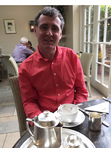My Friends by Hisham Matar – Democracy is a slow process of stumbling to the right decision instead of going straight forward to the wrong one.

My Friends, published 2024, is a novel by Hisham Matar, long-listed for the Booker Prize.
Khaled, the narrator, is not an action hero by any stretch of the imagination. He’s a quiet, intellectual young man, a Libyan student studying English at Edinburgh University in the mid 1980s. At that time I was a similarly less-than-heroic student studying English at Warwick. Sometimes people would knock at the door of my campus study bedroom, asking me to go on demos. I would politely decline. Khaled’s instinct would be to do the same. However, in April 1984, his more radical friend, Mustafa, persuades him to attend a demonstration outside the Libyan embassy in St James’s Square, London. You can see why Khaled might take a deep breath and decide that attending one demo might be the decent thing to do, given the recent execution of student activists by the Libyan government.
Inexperienced in the ways of protests against dictatorial regimes, Khaled and Mustafa get to London and realise they need some kind of face covering to protect their identities from Libyan spotters. After locating a couple of black polyester balaclavas in a sex shop, they make their way to St James’s Square. Khaled plans to just do a quick bit of shouting, before slipping away to find lunch in China Town.
He doesn’t get to do this because someone inside the embassy points a machine gun out of a window and starts shooting, wounding eleven protesters and killing a young police woman called Yvonne Fletcher. I remember watching reports on the news.
This part of the book is very dramatic, particularly scenes at Westminster Hospital where a badly injured Khaled is taken. His life changes from this point on. He is a marked man and cannot go home to Libya. Politics is not some student game anymore. How will Khaled and his friends react? What form will their ‘growing up’ now take?
Responses vary between joining armed militias, to vaguely hoping that if only people would read more books and let things work out for themselves, life would go better. This all takes place against the backdrop of London, presented as a natural place of exile, a place of buses to Marble Arch, of fog and cosy restaurants.
This vision of London had me pondering on what I felt I found out about British government during my university years. Might there be something about it that offers protection from extremism, that makes London a place to run to rather than away from? As it turned out, I discovered that if there is a protective tradition, it maybe has little to do with fairness, or representation, or any of that idealistic stuff. Instead the defining characteristic of British government seems to be the habit of doing nothing unless absolutely necessary and then doing as little as possible. This philosophy of Queen Elizabeth I has, to a greater or lesser extent, for better or worse, echoed down the centuries. While doing nothing is not always the best plan, some of the failures of recent administrations can be characterised as an abandonment of the instinct to do nothing unless forced – whether that was Margaret Thatcher rejecting consensus in the 1980s, Tony Blair invading Iraq in the 1990s, or Conservative governments demolishing long-standing international agreements in the 2010s. These actions served to remove government from the calm centre and throw it into surrounding chaos.
My Friends does not have a prescription for good government. What it does is personify different prescriptions in the characters of a group of devoted friends, who are both uneasy, and deeply admiring, of each other. The relationship is the thing, rather than one of them winning. Ultimately, however, I would point out that the narrator of this novel, the hero if you like, is the one who lives a bookish life in London. He is the novel’s quiet central government. Chaos rages around him. And if there is a lesson in My Friends, it might have something to do with that.



